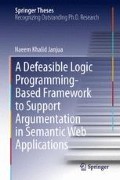Abstract
In Chap. 2, a review of the literature on argumentation, philosophical and logic-based models, argumentation frameworks and implementations was presented. The current reasoning approaches being employed in Semantic Web applications were also discussed and categorised. Several advancements that have been made in terms of reasoning on information on the Semantic Web were outlined.
Access this chapter
Tax calculation will be finalised at checkout
Purchases are for personal use only
References
Bassiliades N, Antoniou G, Vlahavas I (2004) Dr-device: A defeasible logic system for the semantic web. In: Ohlbach, H.J. and Schaffert, S (eds) Principles and Practice of Semantic Web Reasoning, Lecture Notes in Computer Science, vol 3208. Springer, Berlin, p 134–148
Burstein F, Gregor S (1999) The systems development or engineering approach to research in information systems: An action research perspective. In: Hope B and Yoong P (eds) Proceedings of the 10th Australasian Conference on Information Systems. Wellington, Australia, pp 122–134
Carlsson C, Turban E (2002) DSS: directions for the next decade. Decis Support Syst 33(2):105–110
Chesnevar C, McGinnis J, Modgil S, Rahwan I, Reed C, Simari G, South M, Vreeswijk G, Willmott S (2006) Towards an argument interchange format. Knowl Eng Rev 21(4):293–316
Cohen R (1987) Analyzing the structure of argumentative discourse. Comput linguist 13(1–2):11–24
Grosof B, Gandhe M, Finin T, et al. (2002) Sweetjess: Translating damlruleml to Jess. In: Proceedings of the International Workshop on Rule Markup Languages for Business Rules on the Semantic Web at 1st International Semantic Web Conference, vol 60. Sardinia, Italy
Iyad Rahwan CR (2009) The Argument Interchange Format. In: Rahwan I, Simari GR (eds) Argumentation in Artifical Intelligence, Springer, chap 19, pp 383–402.
Kaplan B, Maxwell J (2005) Qualitative research methods for evaluating computer information systems. In: Anderson J, Aydin C (eds) Evaluating the organizational impact of healthcare information systems. Health informatics, Springer, New York, chap 2, pp 30–55, doi:10.1007/0-387-30329-4_2
McTavish DG, Loether HJ (1999) Social research. Allyn & Bacon, London
Nunamaker JF Jr, Chen M, Purdin TDM (1990) Systems development in information systems research. J Manag Inf Syst 7(3):89–106, http://dl.acm.org/citation.cfm?id=116927.116932
Pham D, Governatori G, Raboczi S, Newman A, Thakur S (2008) On extending RuleML for modal defeasible logic. In: Bassiliades N, Governatori G, Paschke A (eds) Rule representation, interchange and reasoning on the web, vol 5321. Lecture Notes in Computer ScienceSpringer, Heidelberg, p 89–103
Rahwan I, Zablitha F, Reed C (2007) Laying the foundations for a World Wide Argument Web. Artif Intell 171(10–15):897–921
Shim JP, Warkentin M, Courtney JF, Power DJ, Sharda R, Carlsson C (2002) Past, present, and future of decision support technology. Decis Support Syst 33(2):111–126
Author information
Authors and Affiliations
Corresponding author
Rights and permissions
Copyright information
© 2014 Springer International Publishing Switzerland
About this chapter
Cite this chapter
Janjua, N.K. (2014). Problem Definition. In: A Defeasible Logic Programming-Based Framework to Support Argumentation in Semantic Web Applications. Springer Theses. Springer, Cham. https://doi.org/10.1007/978-3-319-03949-7_3
Download citation
DOI: https://doi.org/10.1007/978-3-319-03949-7_3
Published:
Publisher Name: Springer, Cham
Print ISBN: 978-3-319-03948-0
Online ISBN: 978-3-319-03949-7
eBook Packages: EngineeringEngineering (R0)

